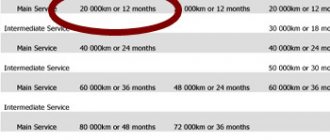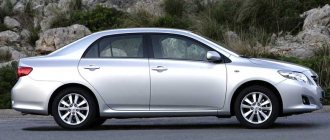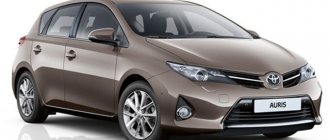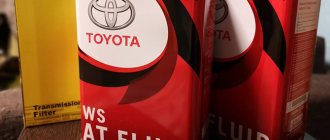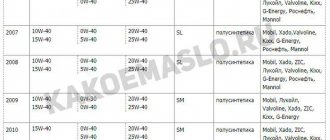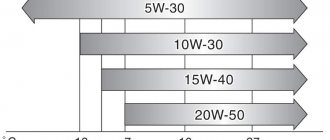Oil for Toyota Corolla is selected taking into account the type of engine, its condition and climatic conditions. The legendary Japanese compact car has been produced since 1966; just 8 years after its launch, the model entered the Guinness Book of Records as the best-selling car in the world. The model has been supplied to Russia since the fourth generation, and the twelfth generation is already on sale today.
Over the entire existence of the car, a huge number of engines have been designed, mostly gasoline, but there are also several diesel power units. In this article we present oils recommended by the manufacturer, as well as analog lubricants.
About tolerances
Gasoline engines:
- 1AZ-FE, 1NR-FE, 2ZR-FE, 1ZR-FE, 4ZZ-FE, 3ZZ-FE, 2ZZ-GE, 4A-FE, 2E, 4E-FE,
Diesel engines:
- 2C-E, 2C, 2C-III, 1C-III
According to API, gasoline engines should be filled with a lubricant of at least SL or SM. In new and relatively new cars (manufactured from 2021 inclusive) it is worth pouring exclusively synthetic material with API quality SN. It is advisable to convert used engines to semi-synthetics.
Original oil
First of all, you should look at the car’s service book, which contains information about the preferred engine oil in terms of quality class and viscosity index. For example, the instructions for the Toyota Corolla 150 indicate that liquid with a viscosity index of 10W-30, 5W-30, 5W-20, 0W-20 according to SAE should be poured.
In principle, the original Toyota SN oil according to the API can be poured into absolutely any gasoline engine or universal ILSAC fluid.
| Toyota Motor Oil 5W-30 SN GF-5 4 liters Article: 08880-10705 Average price: 2200 rubles 1 liter Article: 08880-10706 Average price: 650 rubles | Toyota Motor Oil SN 0W-20 4 liters Article: 08880-10505 Average price: 2600 rubles 1 liter Article: 08880-10506 Average price: 720 rubles |
Approved analogues by tolerance
| Mobil-1 ESP Formula 5W-30 4 liters Article: 152053 Average price: 2970 rubles 1 liter Article: 152622 Average price: 800 rubles | Toyota Motor Oil SM 5W-30 4 liters Article: 08880-09105 Average price: 2400 rubles 1 liter Article: 08880-09106 Average price: 680 rubles |
| Toyota Motor Oil SM 0W-20 4 liters Article: 08880-09205 Average price: 1900 rubles 1 liter Article: 08880-09206 Average price: 550 rubles | Lukoil Lux 5W-30 API SL/CF 4 liters Article: 196256 Average price: 1380 rubles 1 liter Article: 196272 Average price: 400 rubles |
How much oil is in the Toyota Corolla 120 and 150 engine
How many liters should I fill?
- A 1.3 liter engine needs to be filled with 3.2 and 3.7 liters of oil in seventh and tenth generation cars, respectively.
- The 1.4 liter engine holds 3.7 liters of technical fluid, and the 1.6 liter 3.7 engine in the ninth generation and 4.7 liters in the tenth and eleventh generations
Tip: We recommend that you always keep a small amount of engine oil in reserve, since during the operation of the vehicle it may be necessary to add fluid to the internal combustion engine.
Original motor oils
Original Toyota oil is produced only in the brand’s homeland – Japan. Available in 5 liter packages; 4.2 l; 1.5 l; 1.2 l, 1 l and 20 l canisters. There are several lines of motor oils to choose from, from the premium segment to more economical options.
Original motor oils perform the following functions:
- Lubricating the surfaces of engine parts and reducing the harmful effects of friction on them - this effect is achieved thanks to the antifriction additives contained in the oil, which create a special film on the surfaces of the parts that protects them from premature wear. Thanks to the same lubricant, engine parts are protected from overheating.
- Sealing existing micro-gaps on the walls of engine pistons and cylinders - thanks to its structure, Toyota oil effectively seals all existing gaps and creates excellent compression, helping to maintain optimal power of the power unit.
- Cleaning engine parts and protecting against the accumulation of abrasive deposits - during the production process, special detergent additives are added to the oil; they not only effectively clean engine elements, but also prevent the formation of deposits in the future.
- Effective cooling - the oil, during its circulation, successfully removes excess heat from the engine compartment and transfers the heat to the cooling radiator.
What kind of oil to pour into a Toyota Corolla diesel engine?
Engine oil for Toyota Corolla with a diesel engine must also be original. Diesel power units are extremely sensitive to the quality of technical fluid. Incorrectly selected fluid can lead to problems with the DPF. Toyota suggests using branded oil with a viscosity of 0W-30 or 5W-30 according to SAE. An all-season oil that meets the API SL or SM specification, a 5W-30/10W-30 all-season oil with a quality class of SM or SN and marked “energy saving” is suitable.
Toyota Corolla diesel engine oils
| Toyota Engine Oil SN 0W-30 5 liters Article: 08880-80365 Average price: 2600 rubles 1 liter Article: 08880-80366 Average price: 720 rubles | Toyota Motor Oil 5W-30 SN GF-5 4 liters Article: 08880-10705 Average price: 2200 rubles 1 liter Article: 08880-10706 Average price: 650 rubles |
| Shell Helix Ultra ECT C2/C3 0W-30 4 liters Article: 550042353 Average price: 2720 rubles 1 liter Article: 550042390 Average price: 900 rubles | Mobil-1 ESP Formula 5W-30 4 liters Article: 152053 Average price: 2970 rubles 1 liter Article: 152622 Average price: 800 rubles |
Volume
When it’s time to change the oil, the question becomes how many liters of oil to fill?! The answer to this question depends on the engine installed under the hood of your Toyota Corolla.
Below is a list of the entire Toyota Corolla 120 model range with a list of engines, and the required oil filling volumes when replacing.
| Body number | Engine | Model/Volume | Oil capacity, liters |
| Gasoline engines (motor oil classification API SJ..SL / ILSAC GF-3) | |||
| NZE120, NZE124 (4WD) | 2NZ-FE | 1.3i/1.3 | 3.7 |
| ZZE12 | 4ZZ-FE | 1.4i/1.4 | 4.2 |
| NZE121, ZZE124 (4WD) | 1NZ-FE | 1.5i/1.5 | 3.7 |
| ZZE12 | 3ZZ-FE | 1.6i/1.6 | 4.2 |
| ZZE122 | 1ZZ-FE | 1.8i/1.8 | 3.7 |
| ZZE12 | 2ZZ-GE | 1.8i VVTL-i/1.8 | 4.4 |
| Diesel engines (oil classification API CD, CF..CF-4 / ACEA B1, ILSAC GF-3) | |||
| NDE12 | 1ND-TV | 1.4 D4-D/1.4 | 4.3 |
| CDE120 | 1CD-FTV | 2.0d/2.0 | 5.9 |
| CE121 | 3C-E | 2.2d/2.2 | 5.1 |
It is also worth considering that ~0.5 liters of oil is additionally intended for the Toyota Corolla oil filter.
The recommendations are relevant for the Corolla E120, but the above engines, which, depending on the year of manufacture, were also installed on other modifications, therefore, all recommendations are relevant not only for the Corolla, but also for other models with a similar engine. The list of models is given below (models are given not only for the Russian market, but also for Europe, the USA, and Japan):
| Model | Engine & Volume | Year of issue |
| Allex E120 | 1NZ 1.5/1ZZ 1.8/2ZZ 1.8 | 2001-2006 |
| Allion T240 | 1NZ 1.5/1ZZ 1.8 | 2001-2007 |
| Allion T260 | 1NZ 1.5 | since 2007 |
| Auris E150 | 4ZZ 1.4/1NZ 1.5/1ND 1.4 | 2006-2012 |
| Auris E180 | 1NZ 1.5/1ND 1.4 | 2012-2018 |
| Avensis T220 | 3ZZ 1.6/1ZZ 1.8/1CD 2.0 | 1997-2003 |
| Avensis T250 | 1ZZ 1.8 | 2003-2009 |
| Avensis Verso | 1CD 2.0 | 2001-2009 |
| Belta XP90 | 2NZ 1.3 | 2005-2012 |
| bB NCP30 | 2NZ 1.3/1NZ 1.5 | 2000-2005 |
| Caldina T190 | 3C-E 2.2 | 1992-2002 |
| Caldina T240 | 1ZZ 1.8 | 2002-2007 |
| Celica T230 | 1ZZ 1.8/2ZZ 1.8 | 1999-2006 |
| Corolla E100 | 3C-E 2.2 | 1991-2000 |
| Corolla E110 | 4ZZ 1.4/3ZZ 1.6/1ZZ 1.8/1CD 2.0 | 1997-2001 |
| Corolla E150 | 4ZZ 1.4/1ND 1.4 | 2006-2013 |
| Corolla E180 | 1ND 1.4 | 2016-2019 |
| Corolla Axio E140, E160 | 1NZ 1.5 | since 2006 |
| Corolla Fielder E120 | 1NZ 1.5/3C-E 2.2 | 2000-2006 |
| Corolla Fielder E140, E160 | 1NZ 1.5/2ZZ 1.8 | since 2000 |
| Corolla Rumion E150 | 1NZ 1.5 | 2007-2015 |
| Corolla Runx E120 | 1NZ 1.5/1ZZ 1.8/2ZZ 1.8 | 2001-2006 |
| Corolla Spacio E120 | 1NZ 1.5/1ZZ 1.8 | 2001-2007 |
| Corolla Verso E121, R10 | 1ZZ 1.8 | 2004-2009 |
| Echo XP10 | 1NZ 1.5 | 1999-2002 |
| Funcargo XP20 | 2NZ 1.3/1NZ 1.5 | 1999-2005 |
| Isis XM10 | 1ZZ 1.8 | 2004-2009 |
| ist XP60, XP110 | 2NZ 1.3/1NZ 1.5 | 2002-2016 |
| Lite Ace (Town Ace) R40 / R50 | 3C-E 2.2 | 1996-2007 |
| Matrix E130 | 1ZZ 1.8 | 2002-2007 |
| MR-S W30 | 1ZZ 1.8 | 1999-2007 |
| Opa XT10 | 1ZZ 1.8 | 2000-2005 |
| Platz XP10 | 2NZ 1.3/1NZ 1.5 | 1999-2005 |
| Porte NP10 | 2NZ 1.3 | 2004-2012 |
| Porte NP140 | 1NZ 1.5 | since 2004 |
| Premio T240, T260 | 1NZ 1.5/1ZZ 1.8 | since 2001 |
| Probox XP50, XP160 | 2NZ 1.3/1NZ 1.5/1ND-TV 1.4 | since 2002 |
| Ractis P100/P120 | 1NZ 1.5 | 2005-2016 |
| Raum Z20 | 1NZ 1.5 | 2003-2011 |
| RAV4 XA20 | 1ZZ 1.8/1CD 2.0 | 2000-2005 |
| Sienta NCP80, XP170 | 1NZ 1.5 | since 2003 |
| Spade NP140 | 1NZ 1.5 | since 2012 |
| Sprinter E100, E110 | 3C-E 2.2 | 1995-2002 |
| Succeed XP50, XP160 | 1NZ 1.5/1ND 1.4 | since 2002 |
| Town Ace R40 | 3C-E 2.2 | 1996-2008 |
| Vista / Vista Ardeo V50 | 1ZZ 1.8 | 1998-2003 |
| Vitz XP10 | 2NZ 1.3/1NZ 1.5 | 1999-2005 |
| Vitz XP90, XP130 | 1NZ 1.5 | since 2005 |
| Voltz E130 (Pontiac Vibe) | 1ZZ 1.8/2ZZ 1.8 | 2002-2004 |
| WiLL Cypha XP70 | 2NZ 1.3/1NZ 1.5 | 2002-2005 |
| WiLL Vi XP10 | 2NZ 1.3 | 2000-2001 |
| WiLL VS XE120 | 1NZ 1.5/1ZZ 1.8/2ZZ 1.8 | 2001-2004 |
| Wish XE10 | 1ZZ 1.8 | 2003-2009 |
| Yaris XP10, XP90, XP130 | 1NZ 1.5/1ND-TV 1.4 | since 1999 |
What is the replacement interval?
Toyota Corolla engine oil must be changed after every 10 thousand km. This is the vehicle manufacturer's recommended service interval. However, the recommendations are given taking into account the mild Japanese climate, therefore in regions with difficult operating conditions the fluid change interval should be reduced to 5-7 thousand km.
How often should you change the oil in a Toyota Corolla automatic transmission to avoid major repairs?
Periodicity
It is not necessary to count kilometers and the period for changing the engine oil, especially if you travel daily. It is recommended to periodically check the oil level; how to do this is described in more detail on the page - how to change the oil in a Toyota Corolla E120.
Despite the fact that the manufacturer recommends changing the oil in the Toyota Corolla E120 engine every 10,000 km or once a year, whichever comes first. Nevertheless, it is necessary to take into account the condition of the engine, driving style/style, and it also matters where the car is mainly used - on the highway or in city traffic and the climate zone. Therefore, we recommend changing the oil at mileage from 5,000 to 7,500 kilometers, which has a positive effect on the reliability and durability of the power unit, be it a gasoline or diesel engine.
When operating in dusty conditions, towing a trailer or using a roof rack, short trips over distances of less than 8 km and continuous operation of the engine at low speeds over long distances, the engine oil and filter change interval is shorter and is 5000 km or every 6 months
Engine hours
The most optimal guideline for the oil change interval is engine hours: 250 engine hours - under heavy loads (mainly city traffic) and 320 engine hours - if without special loads (highway).
Engine hours: ...
Types of liquids and their effects on the car engine
Oils for automobile internal combustion engines are divided into groups:
- By base or chemical composition. The basic ones are mineral lubricants designed for motors of the 50–60s. last century. Semi-synthetic materials are characterized by increased fluidity and resistance to low temperatures; due to the additive package, they better protect rubbing surfaces. Synthetic materials can be divided into subgroups according to the method of production. In addition to hydrocracking technology, lubricants based on esters and polyalphaolefins are used.
- Viscosity regulated by the SAE standard developed by the American Society of Automotive Engineers. The parameter determines the behavior of the material at high and low temperatures and affects the ease of starting and reliability of protection of motor parts.
- Quality regulated by API, ACEA or ILSAC standards. The parameter allows you to determine the suitability of the lubricant for use in engines of different generations. There are additional tolerances developed by automobile concerns. Compliance information is provided on the label.
Common problems with high lubricant consumption
The reasons for the drop in oil level are:
- Leaking through the front seal or through gaskets that have lost their tightness. The defect is detected during a visual inspection of the engine; after replacing the damaged components, the consumption returns to normal.
- Burnout due to prolonged operation under load at high speeds (for example, after a long trip on a country highway). If the engine does not consume oil under normal conditions, then no repairs are required. The problem may occur when using a lubricant that does not meet the manufacturer’s requirements or has signs of counterfeit.
- Burnout due to worn-out parts of the piston group is accompanied by the appearance of a smoky exhaust and increased fuel consumption with the simultaneous activation of the Check Engine warning lamp. To normalize lubricant consumption, a major overhaul of the engine is required. According to the factory instructions, consumption of up to 1 liter of oil per 1000 km is considered the norm. During long-term operation of the engine with increased loss of lubricant, the catalytic converter fails, which increases the cost of car repairs.
Recommendations
Of course, every car owner always tries to fill only high-quality lubricant. But not all parameters of the purchased product fit the recommendations of the car manufacturer. To simplify the selection of oil products for the engine, look in the service book. It is there that the type and type of oil, its viscosity and characteristics that are best suited to your car are indicated. The manufacturer sets the service interval uniquely for each model.
More on the topic:
- How to choose the right tires for a car?
Service interval Toyota Corolla 2007
Pay attention to the wear and tear on your car's engine. The recommendations of the Japanese manufacturer apply to “fresh” engines. Therefore, the oil indicated in the service book, for a car with a mileage of more than a hundred or three hundred thousand kilometers, will not be relevant. If the lubricant for the Toyota Corolla 2007 was 5w30 when purchased, then after almost ten years of using the car it should be more viscous, for example - 10w30. In Russia, the concept of semi-synthetics (made using hydrocracking technology) is popular for cars with “mileage”, just 10w and fits this category. Replacing with a more viscous substance will give the engine “strength” and reduce its wear. You can change the lubricant at home; it is not a difficult, but long-term process.
Toyota has taken care of its cars by releasing a large series of motor oils with a wide range of viscosity and temperatures. At the same time, in the service book, about “engine care,” it is the oil from the Toyota manufacturer that is indicated. But you need to take into account the fact that these are just recommendations and nothing more. After all, you can choose a lubricant that will be suitable in terms of temperature, viscosity, characteristics, availability and price.

